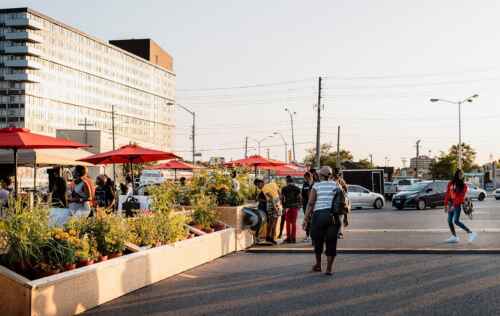A partnered research institute for the study of improvisation in the arts and beyond is among the U of G research projects receiving new funding from the Social Sciences and Humanities Research Council (SSHRC).
The funding is part of more than $16 million announced by François-Philippe Champagne, minister of innovation, science and industry to support more than 650 projects nationwide through SSHRC.
In total, U of G researchers will receive more than $3.9 million in new Partnership, Partnership Development and Insight grants from the federal agency.
“Spanning food systems, sports participation, domestic violence and complex economic modelling, these diverse projects exemplify our University’s commitment to improving life,” said Dr. Malcolm Campbell, vice-president (research).
“This generous funding will make possible the sustained engagement with research questions, institutional partners and community collaborators that is at the heart of research in the humanities and social sciences.”
Lloyd Longfield, MP for Guelph, added, “I am thrilled to see the continued investments from the Government of Canada to University of Guelph researchers who have been advancing improvisational tools to solving real-time problems, transforming municipal spaces, and connecting complex social issues to the arts as way to further understand them and to help with solutions. The work of researchers at U of G continues to help address answer some of the most pressing questions of our time.”
Partnership Grants

Dr. Ajay Heble, a professor in the School of English and Theatre Studies and director of the International Institute for Critical Studies in Improvisation (IICSI), will receive $2.5 million over five years to study how improvisational practices can contribute to more inclusive, democratic, and sustainable futures.
“Crises like the COVID-19 pandemic, racialized violence and climate change show us how crucial it is that individuals and communities adapt, communicate, and re-imagine the world we live in,” Heble said.
“Our research at IICSI suggests that improvisational practices foster our collective ability to respond to these challenges and create a bet
His new Partnership Grant, “Improvising Futures,” will expand the global reach and disciplinary impact of critical improvisation studies (CSI).
The project will bring together an interdisciplinary network of more than 80 researchers, artists and community activists along with 80 organizations from 10 countries.
The team will investigate how arts-based improvisational practices can produce collaboration across diverse fields, such as environmental science, medicine, law and engineering. Projects will focus on four research streams: storytelling, public space, decolonization and wellbeing.
Improvising Futures builds on two other large-scale SSHRC grants for which Heble was the principal investigator. The first phase, supported by a Major Collaborative Research Initiatives grant, established critical studies in improvisation as a new field of interdisciplinary study.
The second phase, funded by a Partnership Grant, built infrastructure to further the field, including IICSI itself, a multi-site partnered research institute; a graduate program in CSI; and the ImprovLab, a state-of-the-art performance facility set to open later this year.
“We don’t know where this new phase will take us,” Heble said. “Being responsive to community voices and emergent themes, to unexpected partners and projects leads to surprising outcomes that couldn’t be reached any other way.”
Partnership Development Grants

Dr. Brendan Stewart, School of Environmental Design and Rural Development, will receive $197,000 over three years.
Since 2018, Stewart and his research team have worked with local business and community groups to transform strip mall parking lots — an underappreciated form of privately owned public spaces (POPS) — into free, accessible and welcoming gathering spaces for suburban Toronto communities.
In partnership with the City of Toronto, the team will use the funding to evaluate and communicate the performance of a new round of pilot projects — which have been funded separately through a Federal Economic Development Agency for Southern Ontario grant — and determine the feasibility of establishing plazaPOPS as a permanent city-wide program.
Insight Grants
Eight scholars in three colleges will receive more than $1.2 million in SSHRC Insight funding, for two- to five-year grants to the following recipients:
College of Arts
- Dr. Daniel O’Quinn, School of English and Theatre Studies, will consider how reviving forgotten 18th-century plays set in what is now the Middle East might deepen our understandings of contemporary political tensions.
- Dr. Christina Smylitopoulos, School of Fine Arts and Music, will investigate how fine art prints might be used to sharpen visual observation skills using U of G’s print study collection.
College of Social and Applied Human Sciences
- Dr. Myrna Dawson, Department of Sociology and Anthropology, will analyze domestic violence death review initiatives to find and address weaknesses in domestic violence intervention and policy.
- Dr. Philip Loring, Department of Geography, Environment and Geomatics, will study the resilience of local and regional food networks to stressors such as climate change events and market upheavals, with the aim of finding ways to strengthen national and global food systems.
- Dr. Leanne Son Hing, Department of Psychology, will test how understanding cumulative advantage — how the rich get richer — and cumulative disadvantage — how the poor get poorer — might redress the effects of intergenerational, race-based and gender-based inequalities in Canadian hiring and university admissions practices.
Gordon S. Lang School of Business and Economics
- Dr. René Kirkegaard, Department of Economics and Finance, will explore the role, design and impact of rules that govern real-world contests like elections and college admissions.
- Dr. Ann Pegoraro, Department of Management and Lang Chair in Sport Management, will assess the impact of COVID-19 on gender equity in Canadian sport and identify ways to build back an improved system.
- Dr. Thanasis Stengos, Department of Economics and Finance, will develop statistical econometric methods to measure the relative economic and human costs of policy responses to COVID-19 such as lockdowns and social distancing.
